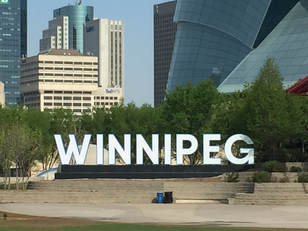 Until this year, I had never been to Canada. It had never even made it onto my bucket list. With hindsight, it seems a strange omission from my extensive travels. After all, my father came from Winnipeg, Manitoba, and I have a plethora of relatives dotted across this vast country. Just a few months ago I knew almost none of my Canadian relations. But they all knew me, for I am the family historian, the depository of our family’s stories. Five years ago my book was published, based on my grandmother’s recollections of growing up in Russia: a Jewish girl living through pogroms, World War I, the Russian Revolution, Civil War and the famine that followed, and her eventual escape to Canada in 1924. Thanks to this book, I am a seen as something of a celebrity, but only among my own family. This year’s trip came about thanks to some cousins from Toronto who were visiting London last December and wanted to meet up. Have you ever had that experience when you meet someone for the first time and it’s as if you’ve known each other forever? Well, it was just like that. They invited me to a family celebration in Toronto in May, where I would have the chance to get together with several of my Dad’s first cousins, among myriad other relatives. Some of them I had been in touch with for many years during my research for the book, but had never met. I took the opportunity to organise some talks and media publicity about the book while I was there, and also to visit Winnipeg. Dad never talked much about Winnipeg, except to tell me repeatedly that it was the coldest city on the planet. He left as a teenager, without finishing high school, and as far as I know, he never went back. I never visited Canada when I was growing up. Childhood trips to see Dad’s family were to Los Angeles, to where his parents, sister and several cousins had all relocated in the 1950s and 60s, escaping the snows of Winnipeg for the Californian sun. Dad himself had settled in LA in 1955, where he picked up his education again after several years of bumming around, studying at Santa Monica City College (Dustin Hoffman and James Dean were fellow alumni from the same era, Dad used to say) then UCLA. From there he won a scholarship to Cambridge, where he met my Mum, and that’s the reason I turned out to be English. Although I had researched my family’s Russian origins in great depth, I had never paid much attention to the Canadian part of our story. But since Dad died in 2012, his life experiences too have become part of our family history. On arrival in Winnipeg I was welcomed like a visiting dignitary. From the airport, I was thrown straight into an interview with a journalist from the Winnipeg Free Press, had time just to jump in the shower before the press photographer arrived for a photo shoot, then was whisked away for an evening reception held in my honour in the very luxurious home of a distant cousin. One of my publicity events in Winnipeg took place at the city library. Afterwards, the curator of the library’s historical collection showed me its copies of Henderson’s Winnipeg Directory, an amazing resource that was published annually from 1882 listing all the city’s inhabitants by name, along with their address and place of work. I found my grandfather and great-grandfather listed, initially under their Yiddish name, Kuperschmidt, then later Coopersmith and finally Cooper, living at 303 Flora Avenue, the house where my father would later grow up. My grandmother was listed from 1925, living on Euclid Avenue and working at the Globe Bedding factory. Dad’s cousin Adele later took me on a tour of the area where the family had lived. That section of Flora Avenue was demolished many years ago, but on my return home I dug out a photo of my grandmother with my father as a little boy, taken around 1935, which I’m guessing shows the house in the background. On Euclid Avenue, we couldn’t find my grandmother’s first Winnipeg home, but came across that of her great-uncle, who had immigrated to Canada in 1914 with his family so that his sons could avoid conscription to the Russian army. Winnipeg, at the confluence of the Assiniboine and Red rivers, was the first permanent European settlement in the Canadian West and grew rapidly in 19th and early 20th centuries as the gateway to the new frontier land of the prairie regions. Town planners designed the city with wide boulevards and grand buildings, aiming for it to become the Chicago of the North. But, as happens in gateway cities, new immigrants came, and then they left – to settle the prairies or to move to Toronto, Vancouver, or the US – places with a less hostile climate and greater opportunities. Winnipeg never lived up to the dreams of its early pioneers and town planners. Knowing my Dad's cosmopolitan tastes, I can see why he wanted to leave. But in finally visiting Winnipeg, a little part of me definitely felt like it was coming home. From and article in Argus Offline, Summer 2018. A Forgotten Land by Lisa Cooper is available on Amazon.com, Amazon.ca and Amazon.co.uk.
0 Comments
|
Keeping stories aliveThis blog aims to discuss historical events relating to the Jewish communities of Ukraine, and of Eastern Europe more widely. As a storyteller, I hope to keep alive stories of the past and remember those who told or experienced them. Like so many others, I am deeply troubled by the war in Ukraine and for the foreseeable future, most articles published here will focus on the war, with an emphasis on parallels with other tumultuous periods in Ukraine's tragic history. Archives
March 2024
Categories
All
|
 RSS Feed
RSS Feed
